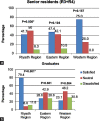Variability of ophthalmology residents' perception toward different major training programs in Saudi Arabia
- PMID: 35814982
- PMCID: PMC9266468
- DOI: 10.4103/sjopt.sjopt_18_21
Variability of ophthalmology residents' perception toward different major training programs in Saudi Arabia
Abstract
Purpose: The constant demand for ophthalmologists has nationally resulted in creating more programs in different regions of the kingdom. We have previously reported the overall residents' satisfaction with the current local ophthalmology curriculum and the competency of the ophthalmic training (clinical and surgical) in our local programs in Saudi Arabia compared to international standards. In this study, we aim at comparing the major local training programs and analyze the differences among them aiming at improving our training.
Methods: This is a cross-sectional study using a questionnaire that was completed by residents and graduates of the local ophthalmology programs in Riyadh, Eastern and Western regions. A closed-ended questionnaire was validated and circulated online and a hard copy was distributed to residents and recently graduated ophthalmologists (2009-2015). Data were categorized by demographic variables, and basic statistics were done. The study has been approved by the Institutional Review Board (IRB) and Human Ethics Committee (HEC) of King Saud University.
Results: Of the 200 individuals surveyed, 175 (87.5%) completed their responses. The average age was 29.6 years (range: 24-39) with 67.5% males and 32.5% females. The overall satisfaction among senior residents and graduates showed a statistically significant higher result among graduates in Riyadh area (P=<0.001). Satisfaction of senior residents with the program director's support was higher in the Eastern region (P=<0.001). Clinic-based training was generally satisfactory. Refractive surgery was reported to be significantly insufficient in 70.6% (P=0.003). Most of the graduates in Riyadh area achieved the surgical requirements for training compared to other regions.
Conclusion: Saudi postgraduate ophthalmology training programs show a variable level of satisfaction among senior residents and graduates. Better surgical exposure has been observed in Riyadh region, however reassessment of the current curriculum and the parameters for training are needed to fulfill the requirements with special attention to the surgical training in all programs.
Keywords: Curriculum; graduates; ophthalmology; postgraduate; program; residents; surgery; training.
Copyright: © 2021 Saudi Journal of Ophthalmology.
Conflict of interest statement
There are no conflicts of interest.
Figures
References
-
- Zhou AW, Noble J, Lam WC. Canadian ophthalmology residency training: An evaluation of resident satisfaction and comparison with international standards. Can J Ophthalmol. 2009;44:540–7. - PubMed
-
- McDonnell PJ, Kirwan TJ, Brinton GS, Golnik KC, Melendez RF, Parke DW, 2nd, et al. Perceptions of recent ophthalmology residency graduates regarding preparation for practice. Ophthalmology. 2007;114:387–91. - PubMed
-
- Michels KS, Hansel TE, Choi D, Lauer AK. Asurvey of desired skills to acquire in ophthalmology training: A descriptive statistical analysis. Ophthalmic Surg Lasers Imaging. 2007;38:107–14. - PubMed
LinkOut - more resources
Full Text Sources


